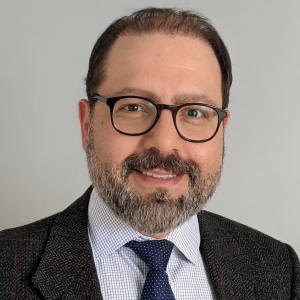The FDA’s director of its Office of Medical Policy wants trial sponsors to keep participant experiences top-of-mind in their decentralized designs.
Endpoints News sat down with Khair ElZarrad last week in San Diego at the Drug Information Association annual meeting. ElZarrad helms the FDA’s 180-person Office of Medical Policy housed within the agency’s drug center, and discussed the office’s progress on several key and upcoming guidance documents.
He explained how his office is approaching AI and how its suite of guidance documents is meant to help improve diversity in clinical trials. The White House’s Office of Management and Budget on Tuesday signed off on long-awaited draft guidance on trial diversity, which is expected to be released soon.
This conversation has been edited for length and clarity.
Lia DeGroot: What are you up to in the Office of Medical Policy and what is your day-to-day like?
 Khair ElZarrad
Khair ElZarradKhair ElZarrad: Our primary task is really to develop policy responses on emerging areas or areas that need to be updated. We are also responsible for anticipating policy challenges. I say anticipating and not forecasting here because it’s not just seeing what’s coming our way, but how do we get ready internally?
The cycle of development is so fast these days that we have to catch up. One thing that the AI team has been doing very successfully is that we typically think of guidances as our product, but they did something really nice which is publishing discussion papers, so a faster way.
DeGroot: Your panel today was about the decentralized trial guidance. I was curious what your take is on the feedback you’ve been getting in those comments. What are some of the big areas that you’re hearing sponsors talk about?
ElZarrad: There is a hunger to clarify certain aspects of decentralization. For example, if you capture data remotely, how would that look in contrast to what you do in traditional clinical trial visits. I feel like the increased generation of data will inform us a lot. The area now that I appreciate coming up is whether participants like certain decentralized elements or not? I think that’s a fair question to ask in different settings. Obviously, not every population would react the same way.
What I’m hoping for is that we will go beyond specific design elements, and people will see our work on decentralized clinical trials, there’s digital technologies, and GCP.
DeGroot: I wanted to ask your take on how sponsors can be thinking about how they handle it. Do they have to set out and be like, this is a decentralized clinical trial based on criteria from the FDA? Or can they take a chunk and use it?
ElZarrad: I would ask the question, does that question matter? You may use certain decentralized elements, but the rest of the trial may be traditional. But the question is, are those elements helpful to you in making the trial more efficient or more patient-friendly?
DeGroot: I know the FDA is working on some goals in terms of diversity in clinical trials. I’m curious if you have any thoughts on how decentralized components of trials could help with some of those diversity goals?
ElZarrad: I would say between the decentralized clinical trial guidance, the DHT [digital health technology] guidance and the work on GCP and the future work on point of care as well, collectively, what I’m hoping for is that will provide the scaffolding for trials to be a little bit more diverse. The ability for the trial to reach a little bit more into the community and provide a little bit more convenience. Collectively, the suite of designs that’s going to enable us to reach communities that historically are not reached.
What I’m hopeful for is that by having some modality of the trials, that will allow healthcare providers in their community to be part of the trial. That will also establish some level of trust. I’m from a Middle Eastern background. My mom loves to go to a Middle Eastern physician, for example, because there is that establishment, they understand each other in a sense. Maybe there is that sense, too, by having the community provider being part of the trial that will enable that connection to happen.
DeGroot: Was there anything else that you’re working on that you want to highlight?
ElZarrad: One thing that I’m both, to be honest, excited and worried about is the work on GCP and ICH E6. We modernized the guideline. It’s published in the draft version. And we received close to 6,000 comments on it. The level of interest was mind blowing to me. We worked on updating the guideline, and hopefully by the end of the year it will be available in a final form.
We highlighted two pillars, what matters for patient safety, and what matters from the reliability of the data perspective. That’s what we’re hoping is the bigger umbrella that everything will be read under. I do worry about over-interpretation. The intent here is to be flexible, the intent here is to focus on what matters most.